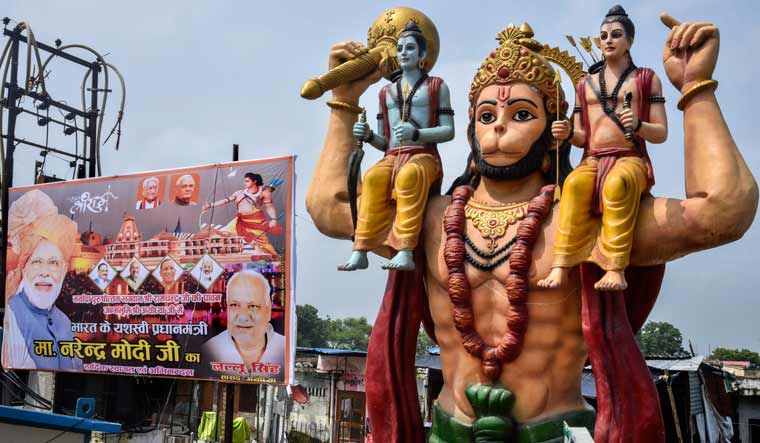The Ayodhya Ram Mandir 'Bhoomi Pujan' ceremony is set for August 5, with Prime Minister Narendra Modi widely expected to attend the function. However, AIMIM MP Asaduddin Owaisi has sparked a debate, questioning whether the premier of a secular state should attend a religious ceremony. PM Modi should not attend it in his official capacity, but can do so as an individual, Owaisi said on Tuesday. "The prime minister has freedom of religion. Every Indian citizen has freedom of religion. But I want to know from the prime minister: does the government of India have a religion? No, because the Constitution clearly says that secularism is part of the basic structure of the Constitution," Owaisi said, speaking to reporters. He wondered why President Ram Nath Kovind had not been invited to the event.
According to him, Modi's attendance at the function would "open up wounds". "We can't forget that for over 400 years Babri stood in Ayodhya and it was demolished by a criminal mob in 1992," the Hyderabad Lok Sabha member further said in the tweet.
The Supreme Court had in a unanimous verdict last year cleared the way for the construction of a Ram temple at the disputed site in Ayodhya, and directed the Centre to allot a 5-acre plot to the Sunni Waqf Board for building a mosque. Shiva Sena chief Uddhav Thackeray, veteran BJP leaders L.K. Advani, M.M. Joshi and RSS chief Mohan Bhagwat were among those invited to the ceremony.
When it comes to the participation of the secular Indian state in religious functions, what does history tell us?
Temple inaugurations by Indian premiers
One of the most contested temple inaugurations was that of the Somnath rebuild in 1951. The Somnath temple, revered as one of the 12 jyotirlingas on which lord Shiva is believed to have appeared as a column of fire, has a bloody history—it was first defiled by Afghan invader Mahmud of Ghazni, followed by Alauddin Khilji and other conquerors like Aurangzeb. Post-independence, there were several plans to reconstruct the temple, first headed by Home Minister Sardar Vallabhai Patel and then by Congress member of the cabinet K.M. Munshi. Jawaharlal Nehru was opposed to it, calling it 'Hindu revivalism'.
When then president of India Rajendra Prasad was set to attend the temple inauguration, Nehru criticised the move on secular principles. As Sarvepalli Gopal noted in his Selected Works of Jawaharlal Nehru, the prime minister wrote: “I confess that I do not like the idea of your associating yourself with a spectacular opening of the Somnath temple. This is not merely visiting a temple, which can certainly be done by you or anyone else but rather participating in a significant function which unfortunately has a number of implications”. He wrote to all chief ministers, saying that the function is not governmental, that the Centre had nothing to do with it, and that nothing should come in the way of the state being secular.
Munshi, in a letter, had criticised Nehru's 'short-sighted secularism': "It is my faith in the past which has given me the strength to work in the present and to look forward to our future. I cannot value freedom if it deprives us of the Bhagavad Gita or uproots our millions from the faith with which they look upon our temples and thereby destroys the texture of our lives. This shrine once restored to a place of importance in our life will give to our people a purer conception of religion and a more vivid consciousness of our strength, so vital in these days of freedom and its trail.”
There are other examples. In 1983, then prime minister Indira Gandhi inaugurated the Bharat Mata Mandir in Haridwar, a representation of Mother India as popularised by Abanindranath Tagore to spur the country on in the freedom struggle against the British. The move, academic Christophe Jaffrelot explained, was one among a series of the Congress party's opportunistic panderings to religious communities. "To begin with, prime minister Indira Gandhi sought to capitalise on religious differences in several blatantly cynical ways. Among other things, she recognised Aligarh Muslim University as a minority institution; promoted militant, secessionist Sikhs like Jarnail Singh Bhindranwale to destabilise the Akali Dal, a rival political party in Punjab; and inaugurated the Bharat Mata Mandir, a temple constructed in 1983 with the support of the Vishwa Hindu Parishad (VHP), also known as the World Hindu Council," he wrote.
BJP leader brings up 'Iftar parties'
BJP MP Tejasvi Surya hit back at Owaisi over his objections, asking whether it was secularism when Iftar parties were hosted by presidents and chief ministers. Surya, the BJP's Karnataka Youth Wing general secretary, also said they did not need lessons in 'constitutionalism' from 'Razakars'. "When Presidents of India & CMs of states were organising Iftaar parties in official capacity, in official residences where was your secularism? Masjid was built by razing the temple. That mistake is now reversed. P.S We dont need lessons in constitutionalism from Razakars," he tweeted.
The Bengaluru South Lok Sabha member was reacting to Owaisi's remarks on Tuesday that the PM should not attend the 'Bhoomi pujan' ceremony of the Ram temple at Ayodhya on August 5 in his official capacity, but can participate as an individual.
-Inputs from PTI


